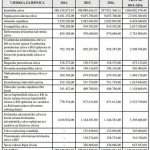ZAGREB, October 25, 2018 – The leaders of four religious communities in Croatia concluded at a round table discussion that religious and other prejudices as potential sources of hatred could be eliminated with the kind of dialogue that does not constitute only an exchange of information but is a real attempt to get to know one another.
A society needs a lifelong process of learning of how to love others – let us get to know one another and we will love each other – that is the conclusion of the round table discussion “Religious prejudices as incitement to hate”, agreed on by the Roman Catholic Bishop of Dubrovnik Mate Uzinić, the Serb Orthodox Bishop of Zagreb and Ljubljana Metropolitan Porfirije Perić, the head of the Croatian Islamic Community Mufti Aziz Hasanović, and Rabbi Luciano Moše Prelević, Croatia’s chief rabbi and the religious leader of the Zagreb Jewish Community.A society needs a lifelong process of learning of how to love others – let us get to know one another and we will love each other – that is the conclusion of the round table discussion “Religious prejudices as incitement to hate”, agreed on by the Roman Catholic Bishop of Dubrovnik Mate Uzinić, the Serb Orthodox Bishop of Zagreb and Ljubljana Metropolitan Porfirije Perić, the head of the Croatian Islamic Community Mufti Aziz Hasanović, and Rabbi Luciano Moše Prelević, Croatia’s chief rabbi and the religious leader of the Zagreb Jewish Community.
The religious dignitaries called on citizens and believes to engage in dialogue and called for tolerance in the society and among religious communities.
Mufti Hasanović said that he saw the round table discussion as an attempt to prevent all forms of hate that could arise from abuse of any religion. It is crucial to dismantle prejudices and promote peace as a universal value, he said. “Cooperation among religious as well as political stakeholders is necessary. If we see our mission as service to our people, we have to know that the people we serve are all the same. Our approach to any citizen and believer must be the same if we wish them and ourselves well, and if we want security for the people and the country,” said Hasanović.
He noted that the political situation in the EU was being radicalised by using the migrant crisis to create a perception about Islam being radical and Muslims being terrorists, which, he said, eliminated any possibility for dialogue and encouraged extremism.
Metropolitan Perić warned about the danger of religious prejudices fomenting hate towards nations and different religious communities. “Hate is something we encounter every day, not only in the media but in our community. The hardest thing to recognise, however, is the hate within ourselves. In order to recognise the tragedy and horror of hate, we have to know ourselves,” Perić said, adding that the biggest problem with prejudices in religious communities, including the Serb Orthodox Church, is “being in love with oneself, isolation and elitism that prevent any form of communication and dialogue.”
Rabbi Prelević said that systematic education in all social groups, notably among children, as well as parents, some of whom, he said, needed to be re-educated in their old age, was the most important instrument in fighting prejudice.
Bishop of Dubrovnik and president of the Croatian Bishops Conference Council for Life and Family, Mate Uzinić, said that the need to exclude others and bias were the main reasons for prejudice and hate. “We hate each other, if I may say so, even though I would prefer to say that we love each other insufficiently, because we read the histories of others from our own perspective, which means that we frequently do it superficially and with bias. We are not willing to make a step forward in an attempt to understand the position of others and thus begin to realise that it is not only others who made mistakes in the past,” Uzinić said, adding that dialogue, as the basic precondition for coexistence, must not have as its goal victory over others.
“We, members of different religions, do not hate each other only because of prejudice, we don’t know how to resist various mundane and political interests. Sometimes we are in the service of politics and we abandon what we are and become something else because of mundane things,” Uzinić said, commenting also on the current migrant crisis. “Christianity will not be threatened by migrants whom we treat as Christians should but by us Christians who do not behave as Christians,” said Uzinić.








